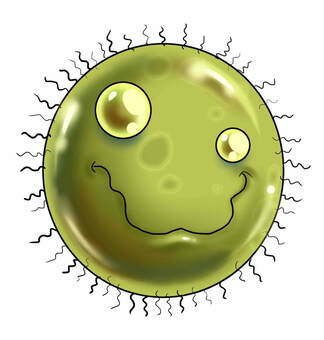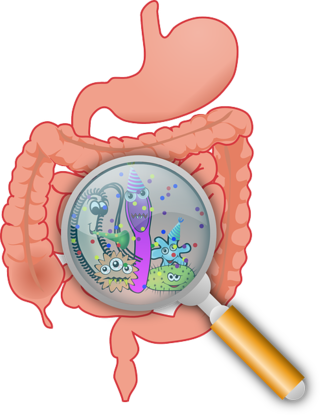20 Ways To Heal The Gut: The Ultimate Gut-Healing Diet PlanGot Anxiety? Brain fog? Fatigue? Improving your gut health could be the answer.
*This page may include affiliate links; that means I earn from qualifying purchases of products.
Why I Want to Help You Heal Your GutI never thought much about my gut. I'm a psychologist and well-being expert, so I focus mostly on what you can do to boost well-being. But this all changed when my gut completely gave out on me. In the blink of an eye, I started getting nauseous, bloated, and belchy anytime I ate anything. I quickly dropped more than 15 pounds, became exhausted, and developed intense anxiety.
I could have seen the signs and prevented this nightmare. My gut had been screaming, "Pay attention to me!" for years by giving me new food allergies, migraines, and tummy troubles. These were all signs that my gut was unhealthy... I just didn't realize it yet. Are You a Therapist, Coach, or Wellness Entrepreneur?
Grab Our Free eBook to Learn How to
|
|
Another way to heal the gut is by removing inflammatory foods or things that your unique body doesn't tolerate well. This helps your immune system decrease it's workload so it can spend more energy on healing the gut.
Although each of us have different problem foods, wheat and dairy tend to be problematic for many people with gut health issues. Sugar feeds many bad bacteria (all carbs are digested as sugar). And partially-hydrogenated oils are toxic, so they busy the immune system leaving other problems in your body unaddressed. That's why it can be really helpful to remove these foods if we want a healthy gut. |
5. Consume Collagen
Collagen makes up the gut’s connective tissue—or the barrier between what's in your gut and the rest of your body. If this barrier gets "leaky" (leaky gut), particles from the gut can seep into the bloodstream, causing everything from the herxheimer reaction (flu-like symptoms), to mental health issues, to autoimmune disease.
Consuming collagen is likely helpful for everyone, but especially those with an unhealthy microbiota. In general, those with gut-health issues tend to have low levels of collagen. In addition, your microbiota affect which symptoms (or diseases) you might get from a leaky gut. So if you have an unhealthy gut, leaky gut may be more problematic. Indeed, I believe collagen was one of the most important supplements I took to heal my gut (and my fingernails are stronger too!)
Consuming collagen is likely helpful for everyone, but especially those with an unhealthy microbiota. In general, those with gut-health issues tend to have low levels of collagen. In addition, your microbiota affect which symptoms (or diseases) you might get from a leaky gut. So if you have an unhealthy gut, leaky gut may be more problematic. Indeed, I believe collagen was one of the most important supplements I took to heal my gut (and my fingernails are stronger too!)
6. Eat Gut-Soothing Foods
We often eat with little consideration for what our gut must then do with our food. In fact, our guts must break down all the chunks, absorb the nutrients, and then push along the indigestible fiber to feed the gut bugs in the lower intestine—that's a lot of work for an unhealthy gut.
To help ease the burden on the gut, we can eat gut-soothing foods such as soft foods (winter squash, soup, banana), cooked foods, and juiced fruits and vegetables. My favorites are spinach and cantaloupe juice , celery juice, and carrot juice. These foods are already broken down, which helps ease the burden on the gut.
To help ease the burden on the gut, we can eat gut-soothing foods such as soft foods (winter squash, soup, banana), cooked foods, and juiced fruits and vegetables. My favorites are spinach and cantaloupe juice , celery juice, and carrot juice. These foods are already broken down, which helps ease the burden on the gut.
PHASE 2
If the tips in Phase 1 aren't resolving your gut health issues, move on to Phase 2. In this phase, you'll focus on more nuanced strategies to improve gut health.
7. Focus on Macronutrients
When it comes to the role of macronutrients (i.e., Carbs, Protein, and Fat) in gut health, the experts are split. Some say that feeding our healthy gut bugs with carbs like fiber, vegetables, and fruits is the best approach. Others say that starving our bad gut bugs by eating primarily fat is the best approach. Indeed, both approaches seem to have benefits... depending on your unique gut and microbiota. So it's important to pay attention to how specific foods make you feel.
For some folks, consuming fiber can exacerbate gut issues. For others, certain types of carbs exacerbate gut issues. For others, consuming high-fat meals exacerbate gut health issues (e.g., those without the enzymes to break down fats). When it comes to your gut health, the key is to eat mindfully and explore how different foods make you feel.
After being a vegetarian my entire life, I found out that vegetables really hurt my gut and I needed to eat mostly meat, sour dough bread, fruit oils (coconut, olive, and avocado), and white potatoes (Juiced fruit and veggies were ok and root vegetables were better than greens). When the gut is unhealthy, the regular healthy diet advice is often not very helpful. Learn how to listen to your body!
For some folks, consuming fiber can exacerbate gut issues. For others, certain types of carbs exacerbate gut issues. For others, consuming high-fat meals exacerbate gut health issues (e.g., those without the enzymes to break down fats). When it comes to your gut health, the key is to eat mindfully and explore how different foods make you feel.
After being a vegetarian my entire life, I found out that vegetables really hurt my gut and I needed to eat mostly meat, sour dough bread, fruit oils (coconut, olive, and avocado), and white potatoes (Juiced fruit and veggies were ok and root vegetables were better than greens). When the gut is unhealthy, the regular healthy diet advice is often not very helpful. Learn how to listen to your body!
8. Try a Ketogenic Diet
Although a Ketogenic diet doesn't seem to work for everyone, it appears to be a good way to reduce inflammation in the body more generally, improve insulin resistance, and clear gunk from the cells. It's also tends to be good for getting rid of bad bacteria and parasites. Why? Because the Ketogenic diet is a low-carb diet, and gut bugs primarily eat carbs.
Keep in mind that starting a Ketogenic diet can often result in a few days or weeks of Keto flu—headaches, leg cramps, sugar cravings, and some other annoying symptoms. To prevent Keto flu, make sure you're getting electrolytes (especially sea salt, magnesium, and potassium). An easy way to do this is by drinking homemade "ketorade".
And if you don't feel good eating Keto after a few days, stop! If your body is already stressed, Keto can be too stressful for your body to handle. You might instead opt for a moderate to low carb diet just to reduce your sugar intake.
Keep in mind that starting a Ketogenic diet can often result in a few days or weeks of Keto flu—headaches, leg cramps, sugar cravings, and some other annoying symptoms. To prevent Keto flu, make sure you're getting electrolytes (especially sea salt, magnesium, and potassium). An easy way to do this is by drinking homemade "ketorade".
And if you don't feel good eating Keto after a few days, stop! If your body is already stressed, Keto can be too stressful for your body to handle. You might instead opt for a moderate to low carb diet just to reduce your sugar intake.
Here's a video explaining a bit more about Keto and gut health:
9. Take Natural Digestive Aids
If your gut is having a hard time digesting, for whatever reason, help it out by consuming natural digestive aids.
- Betaine HCL and Apple Cider Vinegar are helpful for folks with insufficient stomach acid to break down food (common signs of this are heartburn or upset stomach).
- Digestive enzymes are helpful for folks with a sluggish gallbladder or pancreas.
- And ginger is helpful for those with sluggish migrating motor complex (MMC), which helps clean out the small intestine between meals. MotilPro is a fairly popular ginger supplement for the gut.
10. Eat Less to Starve Gut Bugs
If you have an overgrowth of bad gut bugs, part of the goal is to starve them without starving yourself. Some folks advocate for fasting, intermittent fasting, or eating fewer carbs to reduce bacteria like firmicutes, which have been shown to be linked to obesity. Just be sure you're consuming enough calories not to stress your body out.
11. Remove Toxins from Your Life
Sometimes it seems like we are doing everything right, but we still can't seem to get a handle on our gut health issues. In this case, there is often some hidden toxin that's bogging down our immune system.
For example, are we eating all of our food out of plastic with BPA, a known gut toxin? Or are we living in a home that's covered in gut-harming mold? Or are we sleeping on a new bed that sprayed in toxic flame-retardant chemicals? Turns out I had a toxic bed that also had mold on it. Yuk!
Gut-harming toxins are all around us. The electromagnetic waves from our smartphones can even mess with our guts. It's tricky but finding and removing these toxins is often instrumental in healing the gut.
For example, are we eating all of our food out of plastic with BPA, a known gut toxin? Or are we living in a home that's covered in gut-harming mold? Or are we sleeping on a new bed that sprayed in toxic flame-retardant chemicals? Turns out I had a toxic bed that also had mold on it. Yuk!
Gut-harming toxins are all around us. The electromagnetic waves from our smartphones can even mess with our guts. It's tricky but finding and removing these toxins is often instrumental in healing the gut.
PHASE 3
If the tips in Phase 1 and 2 aren't resolving your gut health issues, your gut bugs just aren't going to go quietly into the night—now it's time for war! In this phase, you'll focus on evicting unhealthy gut bugs from your body... by force.
12. Break Up the Biofilms That House Bad Gut Bugs
When bad gut bugs just won't leave, it's often because they have a protective home, or biofilm, to hide in. Often times when we take antibiotics or anti-microbials, the bacteria hide in the biofilm and come back immediately afterwards. This is why it's so important to take biofilm disrupting supplements. The biofilm disrupters include:
We might also try to include garlic and coconut oil in most of our meals. That way when the bacteria come out of the biofilm to eat, they are bombarded.
- Allicin (from Garlic)
- N-acetyl cysteine (NAC)
- Monolaurin (from coconut oil)
- Serrapeptase
- Lumbrokinase
We might also try to include garlic and coconut oil in most of our meals. That way when the bacteria come out of the biofilm to eat, they are bombarded.
13. Eat Probiotic Foods
Consuming probiotic foods is probably the best thing you can do for gut health. Although probiotic supplements can be helpful, they are usually too small to make much of an impact. If you do want to try pills, get pills with 50 billion colony forming units (CFUs). I suggest the probiotic Saccharomyces boulardii, which has been shown to combat digestive issues.
The reason I include this strategy in Phase 3 instead of Phase 1 is because probiotics can often be intense and cause bad die-off symptoms. So, how do you add probiotics to your diet successfully? Try the sauerkraut protocol.
The Sauerkraut protocol
When I did the sauerkraut protocol, it took me about 6 weeks to get through step 3 and about 2 months to get through all the steps. But everyone is different.
The reason I include this strategy in Phase 3 instead of Phase 1 is because probiotics can often be intense and cause bad die-off symptoms. So, how do you add probiotics to your diet successfully? Try the sauerkraut protocol.
The Sauerkraut protocol
- Buy a jar of sauerkraut. Be sure that the jar is refrigerated, has live cultures, and doesn't include any preservatives whatsoever. Here is a handy guide to help you find the right stuff.
- Consume 1 tablespoon of sauerkraut with a meal. Pay attention to how you feel. If you feel die-off symptoms (I did!) then keep eating this small amount once per day until it doesn't feel bad anymore. If you feel fine with the amount of kraut, go to the next step.
- Increase the amount of sauerkraut you eat by 1 tablespoon per meal. Keep paying attention to how you feel to keep die-off symptoms to a minimum. And keep increasing your dosage until you get to 1/2 cup sauerkraut per meal. Make sure you don't go too fast or you'll kill too many bad bugs and feel like absolute garbage.
- Continue this slow-build process with other probiotic foods. Once you tolerate sauerkraut, try kimchi, coconut yogurt, kefir (if you tolerate dairy), coconut kefir, kvass, kombucha, fermented fruit, and so forth until you can eat as many fermented foods as you desire without any symptoms.
- Make your own fermented foods. Once you tolerate store-bought fermented foods, ideally, you should make your own fermented foods. These are far higher in probiotics and have a bigger positive impact on your gut.
When I did the sauerkraut protocol, it took me about 6 weeks to get through step 3 and about 2 months to get through all the steps. But everyone is different.
14. Eat Anti-Bacterial Foods
Probiotics crowd out bad bacteria; anti-bacterials kill bad bacteria. To eradicate stubborn bad gut bacteria, try taking some anti-bacterial herbs.
Some experts recommend you start with less aggressive anti-bacterials like cinnamon, clove, or garlic. Test each of these a little at a time to see how they make you feel. If these don't help, try more intense anti-bacterials like oregano oil, olive leaf, berberine, or grapefruit seed extract in small doses. That stuff is powerful!
Some experts recommend you start with less aggressive anti-bacterials like cinnamon, clove, or garlic. Test each of these a little at a time to see how they make you feel. If these don't help, try more intense anti-bacterials like oregano oil, olive leaf, berberine, or grapefruit seed extract in small doses. That stuff is powerful!
15. Eat Anti-Parasitic Foods
One great, and cheap, way to find out if you have parasites is with anti-parasitic foods, specifically, papaya seeds. You can even test yourself for parasites or do the papaya seed test.
The papaya parasite test
For more, read up on how to do a parasite cleanse.
The papaya parasite test
- Make a papaya smoothie. Toss 1/2 of a papaya in a blender (or less if you prefer). Toss in all the papaya seeds from that half of the papaya. Feel free to add a little juice or water if you like a thinner smoothie.
- Drink the smoothie on an empty stomach. Don't eat anything else for 3 hours (water is fine). This should be enough time for the papaya seeds to get through your small intestine. Pay attention to how you feel. If you get any die-off symptoms, then you might have parasites, and the papaya seeds have just made them angry.
- If you get any die-off symptoms, get a parasite test to find out for sure (the papaya parasite test isn't a sure thing). This is also necessary to see which parasites you have if you do have them.
For more, read up on how to do a parasite cleanse.
16. Eat Anti-Fungal Foods To Kill Gut Candida and Yeast
Just as papaya seeds kill parasites, anti-fungal foods kill gut fungi like candida. A great, and cheap, way to find out if you have problems with gut fungi is with the coconut oil test.
The coconut oil test
The coconut oil test
- Eat 1 tablespoon virgin coconut oil on an empty stomach. Don't eat anything else for 1-2 hours (water is fine). Pay attention to how you feel.
- If you feel die-off symptoms then keep eating this amount of coconut oil (or less) until it doesn't feel bad anymore. If you feel fine, go to the next step.
- Increase the amount of coconut oil you eat by just a tiny bit per day. Keep paying attention to how you feel. Keep increasing your dosage until you get to 2-3 tablespoons of coconut oil per day (you can include this oil in food if that's easier, but it might not be as effective).
17. Combine Anti-Microbial Supplements
Since we don't know which approaches and which herbs will work best on our unique gut bugs, it's helpful to combine different herbs to see which ones work best for us. Here's a few more anti-microbial herbs to explore. But follow the directions on the bottle carefully; these are potent herbs.
A Few More Things That Can Help The Gut
18. Try Some Gut-Healing Foods
Some people swear by celery juice as a way to detox and heal the gut. Others do better eating more meat, bread and white potatoes. Each person is different, so it's key to figure out which foods help you. Sometimes the healthiest foods (like broccoli!) can be the hardest on your gut.
19. Try A Gut-Healing Diet
The Fodmap Diet, GAPS diet, SCD diet, low-fermentation diet, low-residue diet, and Autoimmune Paleo diet might be some diets to look into. Not every diet will work for every person, but usually at least one of these diets will help some.
20. Remember, Healing The Gut Takes Time
The gut is huge. By the time it's hurt, it will take a good amount of time to heal, possibly even years. Try to be self-compassionate, and try not to stress if you have some ups and downs.
Here's 5 more tips keep your gut healthy
Articles Related to Gut Health
Don't Forget to Grab Our Free eBook to Learn How to
Grow Your Wellness Business Exponentially!
Are You a Therapist, Coach, or Wellness Entrepreneur?
Grab Our Free eBook to Learn How to Grow Your Wellness Business Fast!





